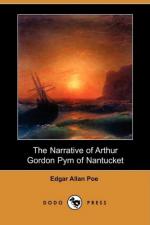|
This section contains 5,904 words (approx. 20 pages at 300 words per page) |

|
SOURCE: “Poe's Providential Narrative of Arthur Gordon Pym,” in ESQ: A Journal of the American Renaissance, Vol. 27, No. 3, 1981, pp. 147-56.
In the following essay, Fukuchi explores the idea of providence in Pym's thematic and structural design, noting that human actions in the narrative are “played out against [a divine plan” that renders them ineffectual.]
The ending of The Narrative of Arthur Gordon Pym has been variously interpreted as a racist allegory, a journey into the depths of the unconscious, a psychological reversion to infancy through return to a maternal figure, a metaphysical journey revealing the meaninglessness, incoherence, or inscrutability of existence, and a spiritual quest for final knowledge or perfect unity.1 The last is closest to the mark, I believe, especially in view of the theological significance at the conclusion of the narrative of the white figure, resembling the Ancient of Days in the Book of Daniel...
|
This section contains 5,904 words (approx. 20 pages at 300 words per page) |

|


